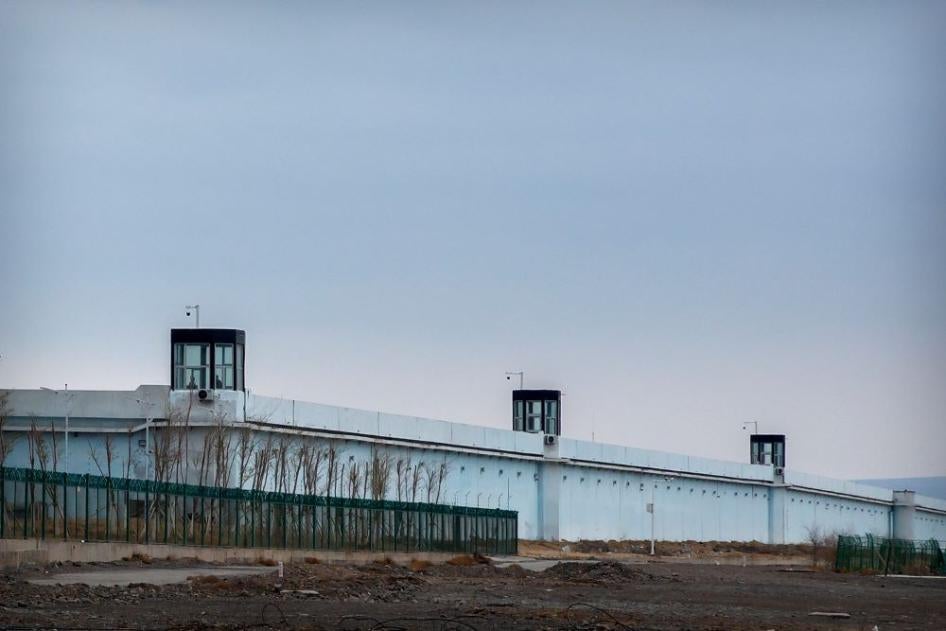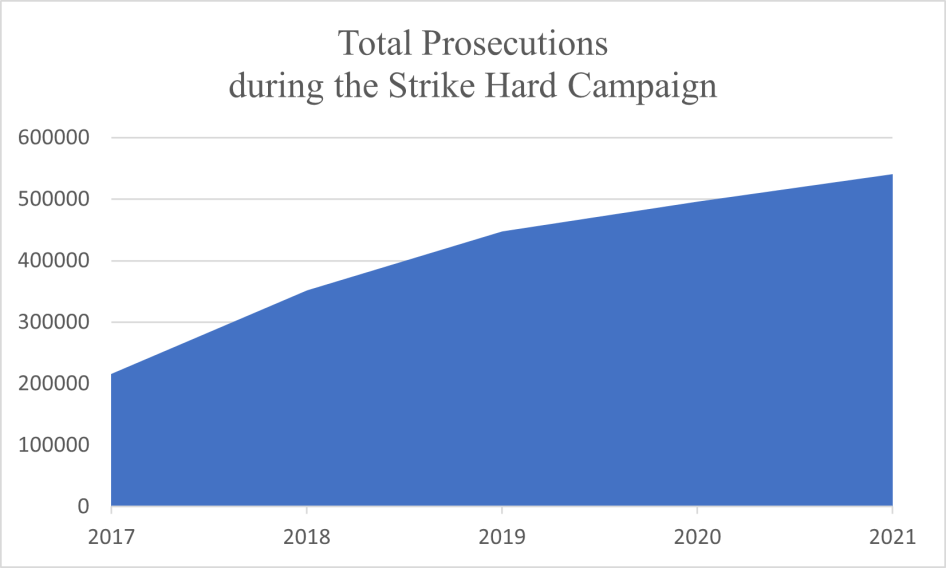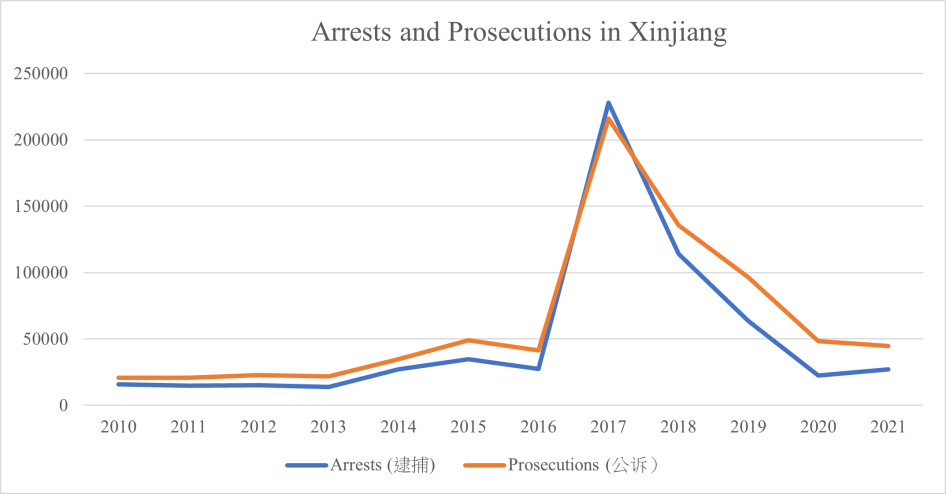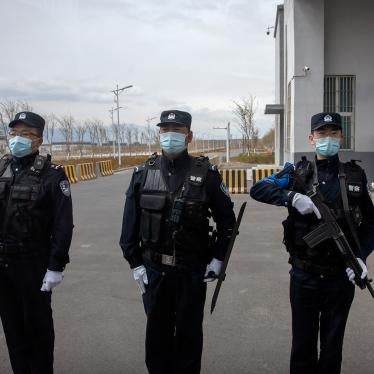(New York) – The Chinese government has used its justice system to sentence and imprison an estimated half-million people during the brutal crackdown in Xinjiang, Human Rights Watch said today.
While not all convicted prisoners faced political charges, the available figures indicate that the total number of people wrongfully imprisoned in the Xinjiang Uyghur Autonomous Region is much higher than generally reported based on earlier official figures. These formal prosecutions, in which many people received punishments without being tried, are distinct from the arbitrary detentions in the extralegal “political education” facilities. Concerned countries should press the Chinese government to release all Uyghurs and other Turkic minorities who are wrongfully detained in Xinjiang and elsewhere.
“The Chinese government may have hoped that formally prosecuting people in Xinjiang would avoid the limelight of mass detentions in extralegal political education camps,” said Maya Wang, senior China researcher at Human Rights Watch. “But many of these convictions just add to the crimes against humanity of wrongful imprisonment against Uyghurs and other Turkic people.”
Xinjiang authorities initiated a Strike Hard Campaign against Violent Terrorism in 2014 but significantly escalated it in 2017. Previously, statistics from the Xinjiang High People’s Court put the total number of people sentenced between 2017 and 2018 at 232,524, a figure that was widely reported in 2019. Since then, the Xinjiang High People’s Court has not released new official sentencing figures.
The Xinjiang High People’s Procuratorate, which has continued publishing statistics, reported in February 2022 that a total of 540,826 people have been prosecuted in the region since 2017. Given that China’s conviction rate is above 99.9 percent, almost all of these 540,826 people would have been convicted.
Year |
Number of prosecutions in Xinjiang per year(Source: Xinjiang High People’s Procuratorate) |
2017 |
215,823 |
2018 |
135,546 |
2019 |
96,596 |
2020 |
48,258 |
2021 |
44,603 |
Total |
540,826 |
The annual arrest and prosecution figures, published by the Xinjiang High People’s Procuratorate, closely track the Strike Hard campaign. At the start of the crackdown in 2014, annual arrest and prosecution figures in Xinjiang jumped by 96 percent and 59 percent, respectively. These figures then spiked dramatically in 2017, the year when the Xinjiang authorities escalated the crackdown.
While the 2020 and 2021 figures have since dropped, they remain elevated, and are comparable to those figures at the start of the Strike Hard Campaign, suggesting that it is continuing.
Available evidence also suggests that the vast majority of the 540,826 people prosecuted most likely remain in prison. Official statistics from the Xinjiang High People’s Court at the start of the government’s Strike Hard Campaign in Xinjiang showed a dramatic increase in the number of people given lengthy sentences. Prior to 2017, about 10.8 percent of the people sentenced received prison sentences of more than five years. In 2017, they made up 87 percent of the sentences. The Xinjiang High People’s Court has also not released new sentencing breakdowns.
The Xinjiang Victims Database, a nongovernmental organization, has extensively documented the cases of over 8,000 detainees based on family accounts and official documents. The group found that, based on a leaked list of prisoners in Konasheher (Shufu) county in Kashgar prefecture in southern Xinjiang, 99 percent of the inmates were given terms 5 years or longer in 2017, with an average of 9.24 years.
Based on such information, an estimated half-million people in Xinjiang remain incarcerated in the region’s prisons since the escalation of the Strike Hard Campaign in 2017.
Very few court verdicts related to the Strike Hard Campaign are publicly available. The Xinjiang Victims Database has documented that the Chinese government is concealing these verdicts from the victims’ relatives and lawyers – in rare cases where they had legal access – and from the public, despite an official commitment to make most court verdicts publicly available.
An earlier Human Rights Watch analysis of 58 of those verdicts that were available suggests that many convicted during the Strike Hard Campaign had been imprisoned without committing a legally recognizable offense. The Xinjiang Victims Database research also shows that in some cases the defendants were not in court when they were convicted, but in extralegal political education camps or pretrial detention centers, without having gone through any semblance of a criminal trial.
Xinjiang’s Strike Hard Campaign has targeted what the Chinese government calls the “ideological virus” of Turkic Muslims. These ideas include what authorities describe as extreme religious dogmas, any non-Han Chinese sense of identity, and relationships with people abroad.
Ostensibly to maintain stability and to counter terrorism in Xinjiang, the Strike Hard Campaign uses mass surveillance and political indoctrination of the entire population. The authorities evaluate people’s thoughts, behavior, and relationships based on bogus and broad criteria – such as whether they use WhatsApp or a Virtual Private Network (VPN) – to determine how their conduct should be “corrected.”
As many as a million people had been wrongfully detained in political education camps, pretrial detention centers, and prisons at the height of the crackdown. Those whose transgressions the authorities consider light are held in extralegal political education camps or under other forms of movement restrictions, including house arrest. Some camp detainees have been released following international pressure, though they continue to be subjected to continued surveillance, control of their movements, and in some cases forced labor. Others remain forcibly disappeared. Past government practice suggests that more “serious” cases are eventually processed in the formal criminal justice system.
The Chinese Communist Party controls all three branches of the criminal justice system, resulting in widespread denial of fair trial rights. While basic procedural protections exist, the authorities can easily circumvent them. The government regularly deprives suspects in political cases of all protections. This is particularly true in the top-down Strike Hard Campaign, in which the Party directs the police, the procuratorate, and the judiciary to work together to meet political objectives.
In April 2021, Human Rights Watch concluded that the Strike Hard Campaign’s abuses in Xinjiang amounted to crimes against humanity – serious crimes committed as part of widespread or systematic attacks on the population. They included mass arbitrary detention, torture, enforced disappearances, mass surveillance, cultural and religious persecution, separation of families, forced returns to China, forced labor, and sexual violence and reproductive rights violations.
Recent official speeches and government reports emphasize that “counterterrorism and stability maintenance” in Xinjiang have to be “legalized and normalized” (反恐维稳法治化常态化), a term that appears to be an interpretation of President Xi Jinping’s speech to the Third Xinjiang Central Work Forum in September 2020. The use of the formal criminal justice system may be part of the authorities’ efforts to “legalize and normalize” the Xinjiang crackdown.
It is unclear whether government efforts to present the campaign as “legalized and normalized” were planned, or a response to unprecedented international attention since late 2018 on the political education camps, or a mix of both. Policy documents since early 2018 have espoused the vision that the campaign’s escalated phase would last for five years from 2017, and that it would “achieve stability within one year, consolidate [such a state] the second year, normalcy in the third year, and overall stability in five years” (一年稳住、两年巩固、三年常态、五年全面稳定).
In December 2021, Ma Xingrui, a technocrat from the Chinese aerospace industry experienced in governing the wealthier coastal regions of Shenzhen and Guangdong, replaced Chen Quanguo, one of the top officials most responsible for the region’s abuses, as Party secretary. In July 2022, President Xi visited the region for the first time since 2014, when he may have paved the way for the repressive campaign. During the July visit, Xi said that while the region must “maintain a firm grip on stability,” it should also “move towards prosperity.”
On August 31, the Office of the United Nations High Commissioner for Human Rights released a report substantiating the mass arbitrary detention, torture, cultural persecution, forced labor, and other serious human rights violations documented by human rights groups in Xinjiang. The high commissioner’s report says the Chinese government’s conduct in the region may constitute international crimes, “in particular crimes against humanity.”
“The Chinese government’s glossy narrative on Xinjiang attempts to turn fiction into fact, saying that everything has been going as planned, and that the Communist Party has quelled any unrest and is now providing economic opportunities,” Wang said. “Governments should reject this fairy tale, seize the momentum of the UN report, and strengthen their efforts to investigate and hold accountable Chinese officials responsible for crimes against humanity.”











